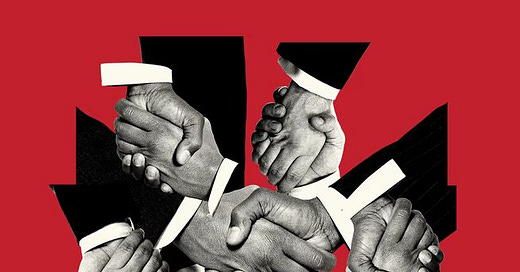Fascism has always understood men better than men have understood themselves. It feeds on their fears and insecurities, dressing them up as strength, purpose, and brotherhood. For all its uniforms and flags, fascism is deeply intimate. It promises the one thing most men cannot admit they crave: the permission to feel important. And in that permission, something cracks open. Something fragile and wounded. That vulnerability is what makes men so dangerous.
Men are often raised to believe their worth is tied to what they build, conquer, or protect. But what happens when they feel they’ve built nothing, conquered nothing, and protected no one? Fascism offers a seductive answer: the promise of purpose, of a war worth fighting, even if it’s against imagined enemies. It replaces the quiet ache of insignificance with the clamour of collective rage.
Fascism is hard to define in a way that captures its full scope. It’s not just a political ideology; it’s a worldview, an atmosphere. It thrives on authoritarianism, nationalism, and the belief in a superior group—whether based on race, ethnicity, or gender. Fascism doesn’t need a coherent philosophy because it isn’t rooted in reason; it’s rooted in emotion. Fear, anger, resentment, and a deep yearning for power fuel it’s rise.
What makes fascism so dangerous is how it simplifies the world. It creates a stark divide. Us versus them, strong versus weak, order versus chaos. It thrives in uncertainty, offering the illusion of clarity in a complex and messy (in their minds, woke) world. For men, this illusion is particularly seductive. It tells them they ca be heroes, protectors, and warriors—but only if they surrender their individuality to the collective. It replaces critical thinking with loyalty, dissent with obedience. And for men struggling with their place in the world, this simplicity can feel like salvation.
The cultural anxiety often centres on their role in a changing world. In societies that are beginning to challenge traditional gender roles, fascism offers an easy answer to a difficult question: What does it mean to be a man? Instead of redefining masculinity in ways that allow for vulnerability and growth, fascism doubles down on old ideas of dominance and control. It offers nostalgia for a time that never truly existed—a time when men were strong, women were subservient, and the world made sense.
But that nostalgia is a lie. It erases the complexity of the past and ignores the suffering caused by those rigid roles. Fascism doesn’t just distort the present; it warps our understanding of history, creating myths to justify its violence.
Power is at the heart of fascism. It promises men that they can regain control—not just over their own lives but over others. For men who feel powerless, this promise is intoxicating. But the power fascism offers isn’t real. It’s performative, fragile, and dependent on oppression. It’s the kind of power that only exists by taking something away from someone else—freedom, dignity, life.
This is why fascism is so dangerous: it convinces men that their strength lies in destruction. It weaponizes their fears, turning them into tools of domination. And in doing so, it destroys not just its victims but its perpetrators, stripping men of their humanity and leaving them hollow.
Beneath the surface of fascism lies an uncomfortable truth: it is built on shame. Men are taught to associate vulnerability with weakness, and weakness with failure. Fascism takes that shame and redirects it outward, transforming it into anger and violence. It tells men that their pain isn’t their fault, that they’re victims of forces beyond their control—immigrants, women, intellectuals, anyone who challenges the status quo. This scapegoating provides a temporary sense of relief, but it’s ultimately destructive, deepening the very wounds it pretends to heal.
When men buy into fascism, they surrender something vital. They trade their humanity for a mask of strength. They lose the ability to connect, to empathize, to be vulnerable. Instead, they become trapped in a cycle of fear and aggression, perpetuating the very systems that make them feel powerless.
Fascism doesn’t just destroy societies; it destroys individuals. It isolates men from themselves, from each other, and from the world. And in that isolation, it breeds more violence, more fear, more pain.



